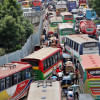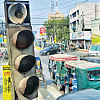In the chaotic maze of Dhaka's streets, rickshaws have long been the lifeblood of daily commutes. Yet, a modern addition to this — the battery-run rickshaw — has sparked a heated debate. For some, these vehicles are a time-efficient and cost-effective blessing; for others, they are a dangerous disruption to the already precarious traffic system.
This ongoing debate has been brought to the forefront recently after a High Court order mandated the removal of all battery-run rickshaws within three days. The move has prompted protests from battery rickshaw drivers, who argue that this will strip them of their livelihoods. Meanwhile, manual rickshaw pullers, commuters, and city planners remain divided on the issue. We spoke to people from different walks of life to understand their perspectives.
These battery-run rickshaws have caused several accidents in areas like Shahbagh and Mirpur. They crash into people and vehicles because their drivers lack balance and education on how to drive properly. We don't want them on the streets.
On roads like Basila, these rickshaws are convenient but risky. Regular rickshaws are not available in some lanes, so we have had to rely on battery-run rickshaws to avoid changing vehicles multiple times on long commutes. They have made things easier and cheaper, but the risk is undeniable.
Battery-run rickshaws should only operate after proper technical inspections. Both the rickshaw and the driver must be licensed, and their numbers should be regulated. Without such oversight, these vehicles will continue to threaten road safety and civic order.
We paddle rickshaw pullers pay taxes to the government and work hard for our livelihoods. Meanwhile, battery-rickshaw drivers take the easy way out, consuming excessive electricity and driving recklessly. They should be banned for fairness and safety.
If you can teach them proper traffic and provide proper punishment for not obeying traffic rules, they should be allowed to continue.
Their recklessness has already cost lives, including that of a student from Jahangirnagar University. I believe these vehicles should be banned before more lives are lost.
I drive a battery-run rickshaw to earn my daily livelihood. While I might find other work, many like me will not. They will be forced into dishonest means like theft or robbery if this ban is enforced. Taking away our jobs will only create more problems.
These rickshaws have no proper brakes, safety features, or policies governing their use. They are high-speed vehicles operating without licenses, making them incredibly dangerous. For the sake of road order and safety, they must be banned.
After inserting engines into the rickshaws, its over-speeding and recklessness have made it just another fatal vehicle of the city.








Comments